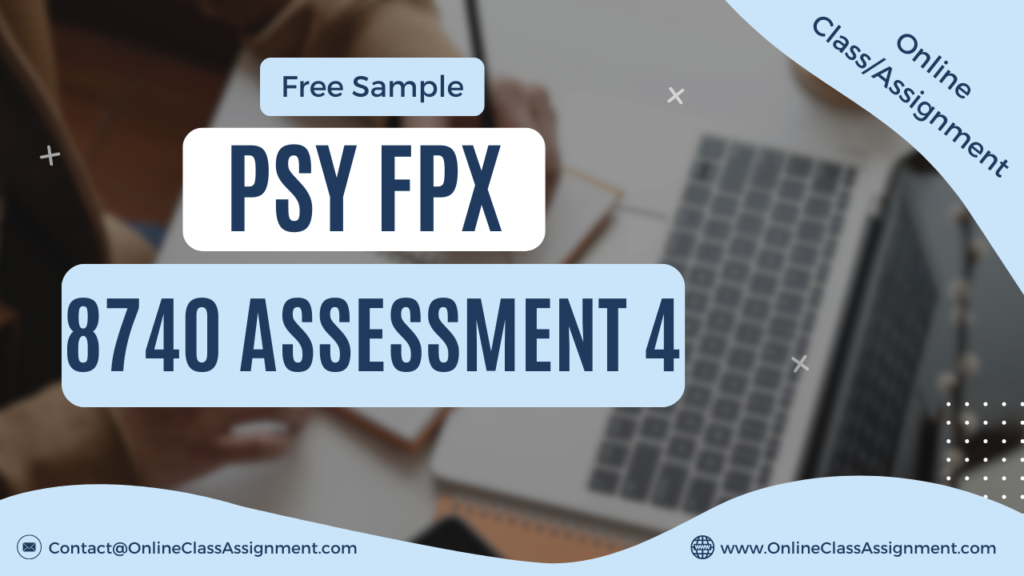
PSY FPX 8740 Assessment 4 Planning
Student Name
Capella University
PSY FPX 8740 Industrial/Organizational Psychology Practices in Human Resource Management
Prof. Name
Date
Analyzing Methods for Assessing Organizational Ethical Culture
Assessing an organization’s ethical culture is imperative for diagnosing and rectifying underlying issues. Utilizing the Corporate Ethical Virtues Model Scale (CEVMS) offers a comprehensive approach, examining eight dimensions of organizational ethics including clarity, congruency, feasibility, and supportability (DeBode et al., 2013). By comprehending the artifacts, espoused beliefs, and underlying assumptions within the organization, valuable insights into areas necessitating improvement are gained.
The process for organizational change encompasses four key steps: diagnosis, planning, implementation, and evaluation (DeBode et al., 2013). Diagnosis entails identifying issues and their root causes, employing tools like the CEVMS to assess employees’ ethical values. Subsequently, an action plan is devised to tackle problem areas, implementing interventions to align organizational culture with desired ethical standards. Continuous evaluation ensures intervention effectiveness, fostering iterative enhancements in organizational culture.
Comparing I-O Psychology Constructs for Evaluating Leadership Candidates
Selecting a suitable CEO involves evaluating personality traits and cognitive abilities. Two commonly used assessments are the Hogan Personality Inventory (HPI) and the Wechsler Adult Intelligence Scale – Fourth Edition (WAIS-IV). The HPI gauges personality traits and occupational scales, offering insights into candidates’ behavior and suitability for leadership roles. Similarly, the WAIS-IV assesses intelligence and cognitive abilities, predicting performance and future behavior (Psychological Testing: Wechsler Adult Intelligence Scale, 2019).
While both assessments provide valuable insights, they have distinct strengths and limitations. The HPI is highly reliable and cost-efficient but should be supplemented with other tools in the hiring process to ensure a comprehensive evaluation (Ng & Sears, 2010). Conversely, the WAIS-IV is a robust predictor of behavior and achievement but may exhibit biases against minorities (Ng & Sears, 2010). Thus, a holistic approach that combines multiple assessment methods enhances the selection process.
Analyzing a Process for Changing Organizational Culture from an Ethical Standpoint
Addressing ethical and legal concerns within an organization demands a structured approach to change. The Competing Values Framework offers a comprehensive model, scrutinizing leadership behaviors and organizational culture. By understanding the four culture types – family, adhocracy, hierarchy, and market-oriented – organizations can pinpoint areas for improvement and nurture a balanced culture conducive to success (Cameron & Quinn, 2011).
Implementing the Competing Values Framework presents challenges, including the time-intensive nature of cultural change and employee resistance (Madsen, 2018). Engaging external consultants and fostering open communication can alleviate these challenges, facilitating smoother implementation of cultural changes aligned with ethical principles.
Applying I-O Psychology Tools and Methods to Create a Job Description
Crafting a job description for the CEO position necessitates a profound understanding of organizational needs and desired qualifications. Leveraging resources such as the Society for Human Resource Management (SHRM) offers a structured approach, encompassing job performance analysis, function establishment, and organizational data organization (SHRM, n.d.).
Synthesizing this information yields a comprehensive job description, delineating requisite qualifications and responsibilities. By aligning the job description with organizational goals and values, the hiring process can effectively identify candidates capable of propelling ethical and sustainable change within the organization.
PSY FPX 8740 Assessment 4 Planning
Conclusion
Addressing ethical and legal concerns within organizations necessitates a multifaceted approach, leveraging insights and tools from the field of Industrial-Organizational psychology. By employing assessment tools, frameworks for cultural analysis, and structured methodologies for job description creation, organizations can adeptly navigate change processes while fostering ethical leadership and sustainable practices.
References
Cameron, K. S., Quinn, R. E., & Skillsoft Books. (2011). Diagnosing and changing organizational culture: Based on the competing values framework (Third ed.). San Francisco, CA: Jossey-Bass.
Cascio, W. F., Aguinis, H. (2011). Applied Psychology in Human Resource Management, 7/e Vitalsource for Capella University. [Capella]. Retrieved from https://capella.vitalsource.com/#/books/9781256845577/
DeBode, J. D., Armenakis, A. A., Feild, H. S., & Walker, A. G. (2013). Assessing Ethical Organizational Culture: Refinement of a Scale. The Journal of Applied Behavioral Science, 49(4), 460–484. https://doi.org/10.1177/0021886313500987
Madsen, S. (2018). Why Is Organizational Change so Hard? Retrieved from https://www.liquidplanner.com/blog/why-is-organizational-change-so-hard/
Ng, E. S. W., & Sears, G. J. (2010). The effect of adverse impact in selection practices on organizational diversity: a field study. International Journal of Human Resource Management, 21(9), 1454–1471. https://doiorg.library.capella.edu/10.1080/09585192.2010.488448
PSY FPX 8740 Assessment 4 Planning
Society for Industrial and Organizational Psychology, Inc. (n.d.). What value does SIOP membership provide? Retrieved from http://www.siop.org/benefits/
Get Capella University Free MS Psychology Samples
PSY FPX 5002
PSY FPX 6710
PSY FPX 5110
PSY FPX 6720
PSY FPX 6730
PSY FPX 6740
PSY FPX 7610
PSY FPX 6O15
